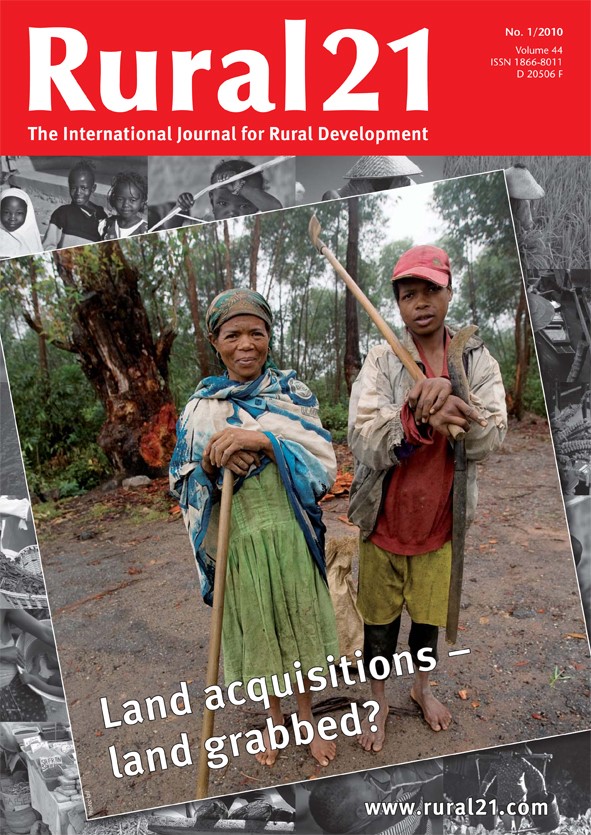Location
The international journal Rural 21 has dedicated more than 40 years to all topics surrounding rural development. Its ambition is to further those strategies and policies that strengthen rural areas of developing and newly industrialising countries and encourage their implementation. The journal addresses the complete range of relevant themes – from agriculture and fisheries via capacity building and education through to health and social security, energy supply and trade. Center-stage is always devoted to inquiring into how measures and strategies can contribute to global food security and to reducing poverty.
Rural 21 desires to further the dialogue between science and politics, the private sector, civil society and practitioners. Two platforms are designed for this purpose: Rural 21 in print is published four times a year, each issue highlighting a specific focus of rural development – this print edition is read in more than 150 countries. In parallel, Rural 21 online keeps the rural development community up to date on news and events, scientific findings and other print and online publications.
Rural 21 is published by DLG-Verlag GmbH in Frankfurt/Germany. Financial partners are BMZ (German Federal Ministry for Economic Cooperation and Development), GIZ (Deutsche Gesellschaft für Internationale Zusammenarbeit), DLG (German Agricultural Society – Deutsche Landwirtschaft-Gesellschaft), SDC (Swiss Agency for Development and Cooperation) and Helvetas Swiss Intercooperation.
The first issue of Rural 21 dates back to 1968. From 1974 to 2007, the journal was published in three languages entitled "entwicklung & ländlicher raum" / "agriculture & rural development" / "agriculture & développement rural". In 2008, the journal was relaunched as "Rural 21".
Members:
Resources
Displaying 236 - 240 of 319Regional rural development needs people empowerment
Lessons learnt from India prove that people empowerment through self-help groups and target group orientation still matters for sustainable rural development. However, this is only true if economic, socio-cultural, political and environmental empowerment interlock. This article makes an argument for a grassroot-level and participative approach of people empowerment in regional rural development.
A threat to global food security
As the world continues to experience a severe food crisis, with over one billion people going hungry, land grabbing – the purchase or lease of land by wealthy, food-insecure nations and private investors from mostly poor, developing nations in order to produce food crops for export – is gaining momentum. Some governments and international agencies believe that the in? ux of money and technology can turn land grabbing into a win–win situation for all involved. But is this really the case?
Indigenous people are losing their livelihood
In many Asian, African, and South American nations, indigenous people are being driven from their homes: Government authorities are leasing hundreds of thousands of hectares of land belonging to indigenous people who only in the rarest of cases possess deeds to the land that are recognised by the authorities. Although in many cases their ancestors have lived on the land for centuries, these rights were never recorded in the land registries. The way of life and the livelihood of many indigenous peoples are severely threatened by their land being sold off.
Water harvesting for home food security
Poverty in rural households have deepened in the past two years through world events: unprecedented rises in food and fuel prices were followed by global economic meltdown, all amidst growing climate uncertainty. Balancing water availability within and across growing seasons, water harvesting helps to buffer households against drought. Research on water harvesting in South Africa has focused on rural household livelihoods. Innovative results on appropriate water harvesting technologies and food security facilitation techniques are now being implemented in villages across South Africa.
Maize to help prevent night blindness
A team of German and Spanish scientists has genetically modified a maize plant in a way that markedly increases the level of three vitamins in the maize kernels. The level of betacarotene, the precursor to vitamin A, was raised by a factor of 169, the level of vitamin C increased six-fold and the level of folic acid, a vitamin of the B group, doubled.



